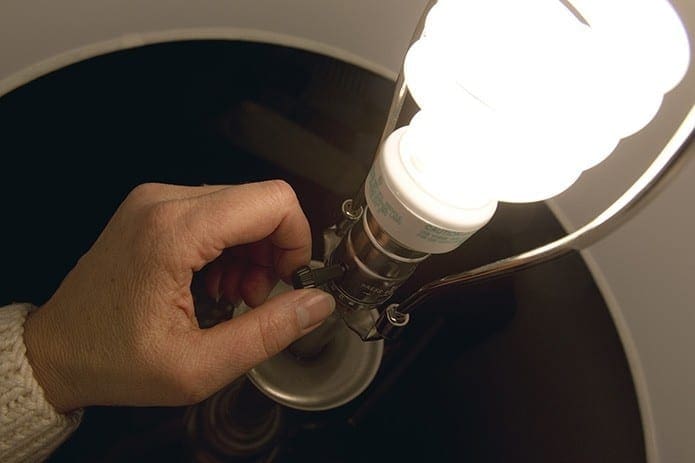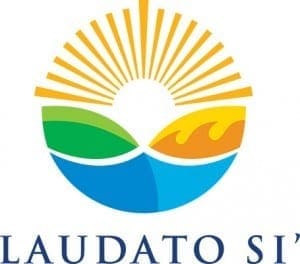 CNS photo/Nancy Wiechec
CNS photo/Nancy Wiechec Atlanta Archdiocese teams with scientists to develop energy saving plan
By ANDREW NELSON, Staff Writer | Published June 25, 2015
ATLANTA—Scientists and engineers at the University of Georgia are working with the Archdiocese of Atlanta to help parishes, schools and parishioners reduce their carbon footprint.
 Pope Francis’ encyclical presents a “moral imperative” to address climate change and can inspire the scientific community and faith organizations to work together, said Susan Varlamoff, the director of the Office of Environmental Sciences at the university’s College of Agricultural & Environmental Sciences.
Pope Francis’ encyclical presents a “moral imperative” to address climate change and can inspire the scientific community and faith organizations to work together, said Susan Varlamoff, the director of the Office of Environmental Sciences at the university’s College of Agricultural & Environmental Sciences.
“By reducing energy use, you have more money to help the disadvantaged,” she said. Varlamoff said she woke up before dawn on Thursday, June 18, to read the papal document, titled “Laudato Si’ (praised be you), on Care for Our Common Home,” when it was released online.
The environmental encyclical is a call to save a planet that is “beginning to look more and more like an immense pile of filth” and which could see “an unprecedented destruction of ecosystems” during this century, wrote the pope.
‘This is my life’s work’
Varlamoff, who attends St. John Neumann Church, Lilburn, said she shared the document with her colleagues in environmental science.
“I’m honestly ecstatic,” she said of the pope’s message.
“This is my life’s work. Let’s hope the pope can move people” to act, she said.
Varlamoff said she has organized an interdisciplinary team to write a report that is due out in a month’s time. It will have specific recommendations, including best practices and examples of what parishes, schools, individual Catholics and people of other faiths can do to help fulfill Pope Francis’ vision of caring for the Earth, she said.
The plan is being developed for the Catholic Church, but it will be available to any faith group, she said. Working collectively will have beneficial effects on the environment, she said.
One parish in the archdiocese announced on Twitter before the release of the papal document that it was taking steps to be a better environmental steward. Most Blessed Sacrament Church, Atlanta, announced plastic foam plates and non-reusable utensils would be eliminated at parish events. Also, the church replaced incandescent light bulbs with LEDs and encouraged parishioners to do the same at home.
Varlamoff said she was inspired to create the report after attending a conference of the National Council for Science and the Environment. There was a panel highlighting the role of the faith groups, but there weren’t any Catholics on the board, so she got involved. Later, she met with Archbishop Wilton D. Gregory who encouraged her to make the encyclical’s message more practical for people in Georgia by developing a plan.
The report will be dense with practical ideas. She said the suggestions will range from planting native Georgia plants on parish campuses to encourage biodiversity to installing energy-efficient light bulbs.
Georgia faith community ‘waited … for this spiritual document’
Mark Risse, the director of the UGA Marine Extension Service, who is helping Varlamoff with the project, said he sees faith as tied to conservation.
“I’ve always thought being a conservationist and taking care of God’s earth is part of my faith,” said Risse, a member of the UGA Catholic Center.
The papal document “does jive with the mainstream scientific community,” he said. The science on climate change is very close to being settled, he said.
“We all know we are having an impact on the climate,” he said.
Part of his work involves working with farmers and coastal communities. The farmers aren’t seeing the cool nights important to livestock and crops, and Georgia islands, such as Tybee Island, have to shut main roadways due to frequent flooding.
“The evidence is there. The sea level is rising in those communities,” he said.
Another partner is Georgia Interfaith Power & Light, a nonprofit focused on helping faith communities be better environmental stewards and work on issues of pollution out of respect for creation. The organization performs energy audits of houses of worship, which is key, said Varlamoff, a GIPL board member. In Georgia, a building’s construction can waste a lot of energy. The nonprofit on the Decatur campus of Columbia Theological Seminary can help schools and parishes identify weaknesses in their plant and it also has a matching grant program to help pay for improvements.
In a statement on the encyclical, Rev. Kate McGregor Mosley, GIPL’s executive director, said, “Here in Georgia, people of faith waited in anticipation for this spiritual document to shape the moral response to environmental degradation in our state and the world.”
“We now have heard from the most influential global faith leader that we must take responsibility for the harm we have caused to this Earth and now recognize that we are all called to steward this Earth in more sustainable, life-giving ways.”